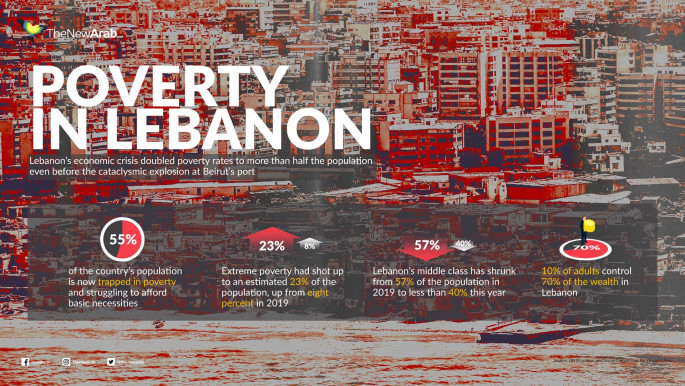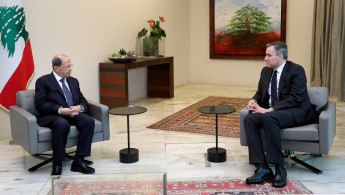Lebanon left reeling after collapse of efforts to from new government
Lebanon was left reeling on Sunday without the slightest prospect of ending multiple crises, after its prime minister-designate stepped down following the failure of talks to form a government, despite international pressure.
Mustafa Adib's resignation on Saturday ended efforts to hammer out a reformist government in the wake of a colossal August 4 explosion in Beirut that killed 190 people, injured thousands and ravaged large parts of the capital.
Political parties had pledged in early September, during a visit to Lebanon by French President Emmanuel Macron, to form a cabinet of independent ministers within two weeks tasked with ending the country's economic malaise.
"As the efforts to form a government reached their final phase, it became apparent to me that this consensus... was no longer there," Adib said on Saturday.
Under the Lebanese constitution, the president must now hold further talks to nominate another prime minister to form a government, but it is a process that risks dragging out and even failing.
Read more: After Beirut blast, mental health is Lebanon’s next crisis
"I don't expect a government anytime soon," said Sami Atallah, who heads the Lebanese Centre for Policy Studies.
"There was a chance, there was a lot of pressure to form a government and it didn't happen," he said, adding there was a "bigger problem" of geopolitical tensions, especially between the United States and Iran.
'Into the unknown'
Adib's efforts were hampered by the claims of two Shia parties, the Iran-backed Hezbollah movement, and its ally Amal, which is led by parliament speaker Nabih Berri, who demanded the finance ministry portfolio.
According to observers, the Shia allies dug in their heels after recent US sanctions were imposed on a minister of the Amal party and two companies affiliated with Hezbollah.
Adib's decision to step aside 26 days after his appointment has left the people of Lebanon feeling as though they are back to square one.
"The page of Mustafa Adib has turned," the French-language L'Orient-Le Jour newspaper declared on Sunday.
It described the return to the drawing board as "a leap into the unknown, even a highway to hell".
Earlier this week, Lebanese President Michel Aoun warned the country was headed to "hell" without a new cabinet.
The Arabic-language newspaper Annahar warned of "grave repercussions", and said all eyes were on Macron, who is due to hold a news conference on Sunday evening.
The UN envoy to Lebanon, Jan Kubis, on Saturday reacted with disbelief: "Such a degree of irresponsibility when the fate of Lebanon and its people is at stake!"
"Politicians, have you really scuppered this unique chance created by France?"
Even before the devastating Beirut port blast, the country was already mired in its worst economic crisis in decades, and its entrenched political class was dealing with widespread popular discontent.
'Lame duck' government
After the country for the first time defaulted on its sovereign debt in March, it launched talks with the International Monetary Fund towards lifting the country out of crisis, but those discussions soon stalled.
Now, with no new cabinet expected any time soon, analyst Maha Yahya said the country was left with a "lame duck" caretaker government.
"Institutions working with it cannot take any decisions and certainly cannot negotiate with the IMF on an economic recovery plan," said the director of the Carnegie Middle East Center.
Many are worried the country is headed from bad to worse, with daily novel coronavirus infection figures on the rise and increasing security incidents reported in recent weeks.
On Saturday night, an attack on an army post in north Lebanon killed two soldiers and an alleged "terrorist".
Police killed nine alleged Islamic State group-linked suspects in a manhunt over a murder last month, a security source said Sunday.
Analyst Karim Bitar said Lebanon was expected to go through a rough patch ahead.
"Even if Lebanon is not hell-bound, we will probably witness... the weakening of public institutions, a worsening of the economic crisis... and a wave of emigration," he said.

Follow us on Facebook, Twitter and Instagram to stay connected





 Follow the Middle East's top stories in English at The New Arab on Google News
Follow the Middle East's top stories in English at The New Arab on Google News
![The UAE is widely suspected of arming the RSF militia [Getty]](/sites/default/files/styles/image_330x185/public/2024-11/GettyImages-472529908.jpg?h=69f2b9d0&itok=Yauw3YTG)
![Netanyahu furiously denounced the ICC [Getty]](/sites/default/files/styles/image_330x185/public/2024-11/GettyImages-2169352575.jpg?h=199d8c1f&itok=-vRiruf5)
![Both Hamas and the Palestinian Authority welcomed the ICC arrest warrants [Getty]](/sites/default/files/styles/image_330x185/public/2024-11/GettyImages-2178351173.jpg?h=199d8c1f&itok=TV858iVg)